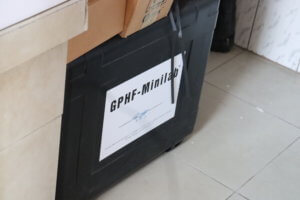Establishing good practices in pharmaceutical aid in the midst of the COVID-19 pandemic: Developing capacities in detecting substandard and falsified medicines using the minilab technology in four countries of Sub-Saharan Africa.
Project Goal: To strengthen the quality assurance of pharmaceuticals amidst the COVID-19 pandemic
Country: Cameroon, Democratic Republic of the Congo (DRC) Central African Republic (CAR), and Liberia
Project summary: Substandard and falsified (SF) medicines are a worldwide problem in health care delivery. Especially in Low and Middle-Income Countries (LMIC), they contribute to the lack of affordable and safe medicines for patients, hampering the efforts of achieving sustainable development goal 3 (SDG) 3. The World Health Organization (WHO) estimates that 10% of medicines are not genuine. Falsified medicines are the reason for countless deaths and substandard Medicines with too little active compound contribute to the emerging threat of Antimicrobial Resistance (AMR).
Supply chains for medicines are fragile and have partly collapsed under the COVID-19 pandemic. Most countries in Sub-Saharan Africa lack enforceable regulations and the necessary laboratories and means to carry out quality control of medicines on the market. The Ecumenical Pharmaceutical Network (EPN) together with DIFÄM (Deutsches Institut für Ärztliche Mission) has established a Minilab- Network that utilizes a Suitcase laboratory to test the 100 most common medical compounds for counterfeits. As at 2021, 18 of EPNs member organizations in 12 countries mainly Sub-Saharan Africa’s are members and are successfully identifying substandard medicines.
Sub-Saharan Africa lack enforceable regulations and the necessary laboratories and means to carry out quality control of medicines on the market. The Ecumenical Pharmaceutical Network (EPN) together with DIFÄM (Deutsches Institut für Ärztliche Mission) has established a Minilab- Network that utilizes a Suitcase laboratory to test the 100 most common medical compounds for counterfeits. As at 2021, 18 of EPNs member organizations in 12 countries mainly Sub-Saharan Africa’s are members and are successfully identifying substandard medicines.
It was the Minilab members in Cameroon and the Democratic Republic of the Congo (DRC) who first reported falsified Chloroquine, after the malaria medicine had been promoted to be a treatment option for COVID-19, leading to a worldwide WHO alert (https://www.who.int/news-room/detail/09-04-2020-medical-product-alert-n4-2020). The findings were also published in a medical paper (https://medicalxpress.com/news/2020-05-drug-counterfeiters-coronavirus-epidemic.html).
Lack of human resources and poor collaboration with government agencies pose a problem for most Minilab partners. The goal of the project is to improve medicine safety through better detection of substandard medicines in DRC, Cameroon, the Central African Republic (CAR), and Liberia. EPN implements this project in partnership with its members that include Association des Œuvres Médicales des Eglises pour la Santé en Centrafrique – ASSOMESCA (Central Africa Republic), Church Heath Association of Liberia, Presbyterian Churches of Cameroun-PCC, and Depot Central Medico-Pharmaceutique (DCMP) in DRC.
By addressing the human resource gap in the Network and the advocacy efforts at the government level, the project expects the following results:
- Enhanced testing of suspected substandard and falsified medicines in the Minilab partner organizations
- The minilab network is strengthened and broadened.
- Minilab partners and government agencies, such as the MoH in the 4 countries are working hand in hand to fight substandard and falsified medicines.
The target groups are the care-seeking patients and the partner organizations’ 700 health institutions which are serving approximately 3.5 million patients a year.